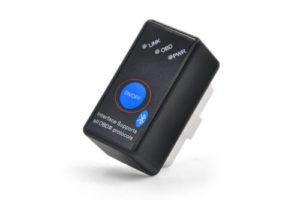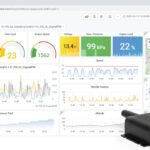For car enthusiasts and those keen on vehicle diagnostics, a Bluetooth Obd2 Scanner Adapter is an indispensable tool. These adapters, often based on the ELM327 chip, bridge the communication gap between your car’s computer and your smartphone or tablet. Whether you’re using an iPhone, iPad, or Android device, understanding the nuances of these adapters is crucial for a seamless diagnostic experience. This guide will delve into everything you need to know to choose the right Bluetooth OBD2 scanner adapter, ensuring you get a quality device that works flawlessly with your vehicle and mobile device.
Choosing the right adapter involves navigating two key aspects: compatibility with your device and the quality of the adapter itself. A subpar adapter can lead to connection issues, inaccurate data, or even potential harm to your vehicle’s electronic systems. Let’s break down the essentials to help you make an informed decision.
Understanding ELM327 OBD2 Adapter Types by Connection
ELM327 OBD2 adapters connect to your devices via different communication methods. Here’s a breakdown of the common types:
-
WiFi Adapters: These adapters create their own WiFi network for your device to connect to.
-
Bluetooth Classic (Versions 1.x, 2.x, 3.x): The traditional Bluetooth connection, widely compatible with Android devices.
-
Bluetooth Low Energy (LE) or Bluetooth 4.0 and above: Designed for low power consumption, this is the preferred Bluetooth type for iOS devices and also compatible with newer Android devices. It’s important to note that Bluetooth and Bluetooth LE are distinct communication protocols despite the name similarity.
-
Bluetooth MFi: This is essentially classic Bluetooth but specifically certified by Apple for use with iPhones and iPads. These adapters require manufacturers to comply with Apple’s requirements, making them less common and often pricier. Examples include OBDLink MX+ and vLinker FS. On Android, they function as regular Bluetooth adapters.
-
USB: While USB OBD2 adapters exist, they are not compatible with the Car Scanner app, which focuses on wireless connectivity.
The best connection type largely depends on your smartphone or tablet’s operating system.
Bluetooth OBD2 Adapters for Apple iOS (iPhone/iPad)
Apple’s iOS ecosystem, used in iPhones and iPads, supports Bluetooth LE (4.0), WiFi, and Bluetooth MFi adapters. Notably, classic Bluetooth adapters (versions 1.x, 2.x, 3.x) are incompatible with iOS due to operating system limitations. This is a critical point for iPhone and iPad users to understand – classic Bluetooth OBD2 adapters simply will not work.
Recommended Connection Type for iOS:
Bluetooth LE (4.0) adapters are generally the best choice for iOS users. They offer a good balance of easy connectivity, acceptable data transfer speeds, and availability. If you’re seeking top-tier performance and speed and are willing to invest more, consider Bluetooth MFi adapters. WiFi adapters are an option, but they can sometimes lead to connection complexities and may interfere with your mobile internet connection.
Crucial Note on Bluetooth Version for iOS:
Paying attention to the Bluetooth version is paramount for iOS users. Many users mistakenly purchase classic Bluetooth adapters, only to find they are unusable with their iPhones or iPads. This limitation is inherent to iOS architecture and cannot be bypassed by any app.
Bluetooth OBD2 Adapters for Google Android
Android devices offer broader compatibility, supporting classic Bluetooth (versions 1.x, 2.x, 3.x), Bluetooth LE (4.0), and WiFi adapters. For Android, classic Bluetooth adapters are often recommended. They tend to provide faster data transfer rates compared to Bluetooth LE and more stable connections than WiFi. A vast majority (around 95%) of Android users utilize classic Bluetooth OBD2 adapters.
Potential Drawback: Some Android devices may experience conflicts when multiple Bluetooth devices are connected simultaneously, such as a Bluetooth OBD2 adapter and a car’s Bluetooth multimedia system.
Quality Matters: Choosing a Reliable ELM327 OBD2 Adapter
Forget outdated advice about specific ELM327 versions, internal chips, or circuit board layers. These factors are no longer reliable indicators of adapter quality. Counterfeiters have become adept at mimicking these features. The essential distinction now is between “good” and “bad” adapters based on their functionality and reliability. A good Bluetooth OBD2 scanner adapter simply works as intended – it connects reliably, transmits data accurately, and doesn’t introduce glitches or freezes. Your primary goal is to identify and purchase a dependable adapter.
Common Issues with Low-Quality ELM327 OBD2 Adapters
Purchasing a cheap, unreliable OBD2 adapter can lead to a range of problems:
-
Complete Failure: The adapter may not work at all, failing to establish a connection with your vehicle.
-
Unstable Operation: Intermittent connectivity, freezing, spontaneous reboots, or temperature/humidity sensitivity are common issues. An adapter might work sporadically, showing inconsistent parameter readings or failing to connect on different occasions.
-
Limited Command Support: Substandard adapters may not support the full set of ELM327 commands, despite claiming to do so. This restricts the diagnostic capabilities.
-
Fixed ECU Address: Some faulty adapters are hard-coded to communicate with only a standard Engine Control Unit (ECU) address, preventing access to other ECUs in your car, such as the transmission or ABS modules.
-
Data Length Restrictions: Limitations on the length of data requests and responses can hinder comprehensive diagnostics.
-
Data Loss: Packet loss during data transmission and reception leads to incomplete and unusable data sets.
-
Data Corruption: Distorted data transmission can result in incorrect readings or, more dangerously, sending erroneous commands to your vehicle’s systems. Imagine sending an erase memory command instead of a temperature request!
-
Protocol Incompatibility: Limited support for OBD2 communication protocols means an adapter might work on some cars but fail on others depending on the protocol used by the vehicle.
-
On-Board Network Interference: Bad adapters can flood your car’s network with junk data, disrupting the ECU’s ability to control the engine and potentially causing rough engine running or other performance issues.
-
Critical Issues with Advanced Functions: If you intend to use advanced features like “Coding and Service” which involve writing data to the ECU, a high-quality adapter is essential. A faulty adapter can lead to data corruption during write operations, potentially causing severe damage to your vehicle’s electronic systems.
The Overwhelming Problem: Regrettably, the market is saturated with more bad OBD2 adapters than good ones. You could easily purchase multiple adapters in hopes of finding a working one, only to be met with repeated disappointment.
Recommended Bluetooth OBD2 Scanner Adapters
It’s important to note that as a content creator, and not an adapter vendor, the following recommendations are based on personal experience and feedback from Car Scanner app users. These are sorted roughly from most expensive to least expensive:
1. OBDLink MX+ with Bluetooth MFi:
- Price: Around $100 USD
- Compatibility: iOS and Android
- Features: Top-of-the-line adapter with advanced features and robust performance. The Bluetooth MFi certification ensures seamless compatibility with Apple devices.
2. OBDLink CX with Bluetooth LE:
- Price: Around $80-$100 USD
- Compatibility: iOS and Android
- Features: Excellent performance with a large memory buffer, ensuring fast and reliable data transfer. Bluetooth LE makes it ideal for iOS while working perfectly on Android too.
3. vLinker Devices: vLinker has emerged as a reputable brand offering several reliable OBD2 adapters:
-
vLinker MC+ with Bluetooth LE:
- Compatibility: iOS and Android
- Recommended for: iOS users seeking a reliable Bluetooth LE adapter.
-
vLinker FS with Bluetooth MFi:
- Compatibility: iOS and Android
- Recommended for: iOS users wanting Bluetooth MFi certification.
-
vLinker MS with Bluetooth MFi: Designed as a competitor to OBDLink adapters. Initial versions had issues, but firmware updates have significantly improved their reliability and performance.
- Recommendation: For iOS, consider MC, MC+, FS, or MS. For Android, any vLinker adapter should work well. Ensure you check for firmware updates, as early versions could be buggy, but vLinker provides user-upgradable firmware.
4. Vgate iCar Pro 2S:
- Features: The successor to the iCar Pro BLE, offering improved performance and reliability. If choosing between iCar Pro and iCar Pro 2S, the 2S is the better option.
5. Vgate iCar Pro BLE (Bluetooth Low Energy):
- Compatibility: iOS, Android, Windows (due to Bluetooth 2.0 + Bluetooth 4.0 chip).
- Note: Older firmware versions (prior to v.4.1.02, 2021/01/08) had issues with CAN Extended addressing used in Toyota and BMW vehicles. Firmware updates resolve this. You can download the latest firmware for Vgate iCar Pro from the provided link.
OBD2 Adapters to Absolutely Avoid
To help you steer clear of problematic devices, here is a list of Bluetooth OBD2 adapters and characteristics to avoid:
-
xTool Adapters: These are not ELM327 compatible and only work with xTool’s proprietary software.
-
Wired Adapters (USB, COM): Car Scanner exclusively supports wireless adapters.
-
Adapters with “Mini” in the Name: These are overwhelmingly likely to be low-quality.
-
Extremely Cheap Adapters: Significantly low prices are often indicative of poor quality components and unreliable performance.
-
Adapters with Bluetooth MAC Addresses Starting with 11:22:33 or 00:00:00: These are red flags for potentially cloned or unreliable devices.
-
KONNWEI Devices: While previously recommended, recent KONNWEI adapters have shown a decline in quality, frequently losing data packets.
-
“Micro Mechanic” Adapters: Many users report these adapters failing after a short period.
-
“THINMI.COM” Adapters: Known for limited ELM327 command support and frequent fake responses.
-
KUULAA Brand Adapters.
-
Adapters with a Specific Design (pictured below): While some of these designs might be functional, the vast majority are of very low quality. Avoid these generic-looking adapters:
 Bad ELM327 Adapter Design 5
Bad ELM327 Adapter Design 5
In Conclusion
Choosing the right Bluetooth OBD2 scanner adapter is crucial for effective car diagnostics. Prioritize compatibility with your operating system (iOS or Android) and focus on adapter quality over price. Investing in a recommended adapter from reputable brands like OBDLink or vLinker can save you from headaches and ensure a reliable and accurate diagnostic experience. Remember to avoid the red flags associated with low-quality adapters to protect your vehicle and ensure you get the diagnostic capabilities you need.
P.S. Please note that links on this page to Amazon.com are affiliate links, and as an Amazon Associate, I may earn from qualifying purchases.

